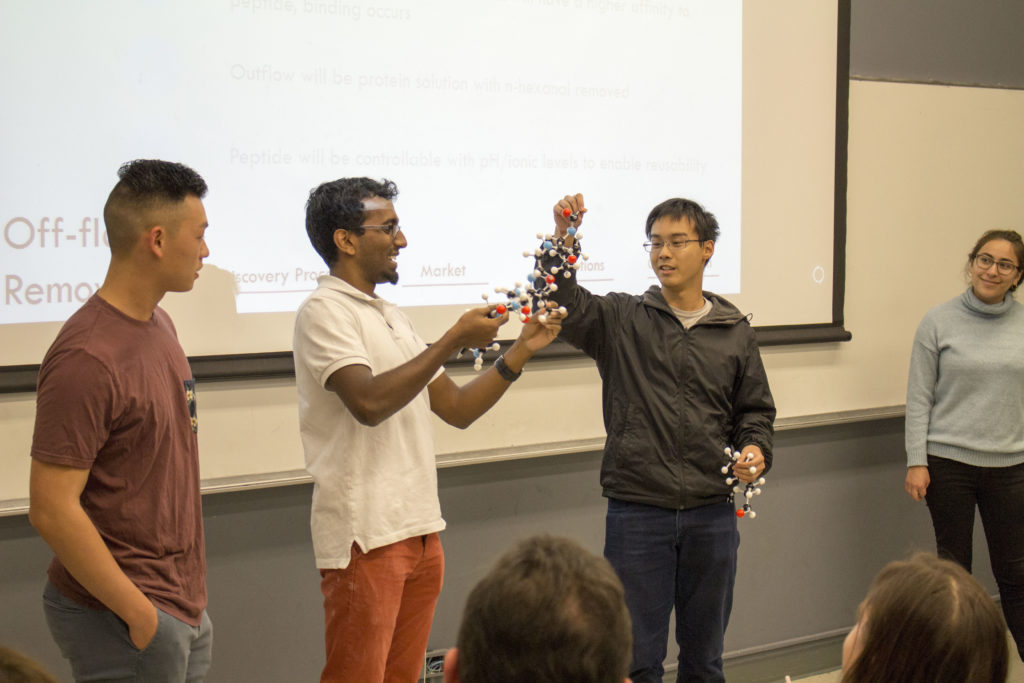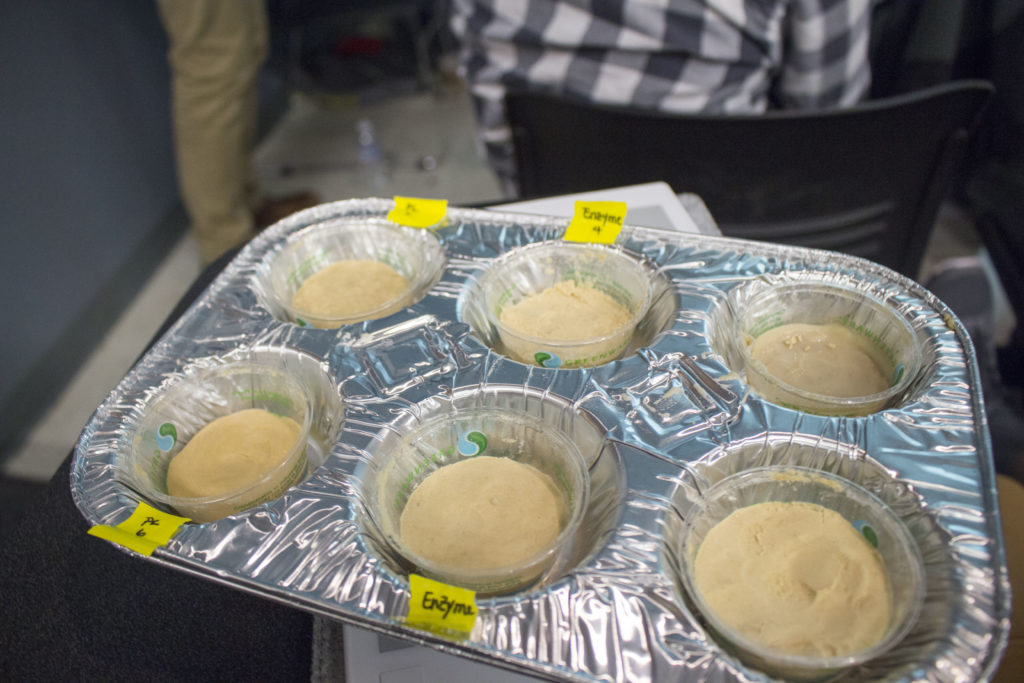
This week at the Alternative Meat Lab, students presented their latest plant-based meat projects and welcomed new board members who will be donating their expert advice to assist the lab with domain-specific knowledge in an industry that is just getting started.
The Alternative Meat Lab board members include:
-
- Ryan Bethencourt, partner and co-founder of IndieBio, the world’s leading biotech accelerator. Ryan is also faculty at Singularity University and CEO & co-founder of three biotech companies.
- Peter Cnudde, industry fellow and advisory board member for the Sutardja Center and former vice president of engineering at Yahoo. Peter was one of the people behind the creation of the plant based meat courses at the Sutardja center.
- Julie Mann, global protein program manager at Ingredion Inc., a leader in developing ingredients such as sweeteners, starches, and biomaterials. Ingredion is also a leader in developing pulses, which are promising raw materials for the production of plant-based meats. Before joining Ingredion, Julie spent more than twenty years as an innovator and researcher at The Hershey Company.
- Scott May, vice president of global innovation at Givaudan, an international leader in developing flavors and fragrances, including for leading plant-based meat companies. Scott currently heads up MISTA for Givaudan, a state-of-the-art product development facility located in San Francisco.
- Jason Ryder, interim CTO of Hampton Creek, a leading plant-based foods company. Jason is a UC Berkeley chemical engineer (PhD, ‘03) and Vice President of Process Research & Development at Hampton Creek.
- Ricardo San Martin, visiting professor at UC Berkeley from Pontifical Catholic University of Chile. Ricardo is the instructor for alternative meat courses and co-lead for the lab.
Advisors and board members watch student presentations. From left to right: Scott May, MISTA & Givaudan; Flavio Garofolo, Givaudan; Professor Ricardo San Martin; Allison Berke, Good Food Institute; Ryan Bethencourt, IndieBio; Rebecca Cross; Peter Cnudde, Yahoo
Next generation plant-based meat
Students also presented their final projects from the fall 2017 semester, which included innovative product ideas to solve some of the current issues with alternative meat texture, taste and moisture. Projects ranged from recognizable “meat” products such as deli slices, bacon, fish cakes, and beef jerky replacements, to the highly technical, such as engineering better plant-based fat.
One team with the project titled “Removal of off-flavors in legumes” focused on a big problem with using pea protein in plant-based meat products — its flavor. Pea protein has grown in popularity among plant-based enthusiasts as an alternative to soy, but its organic compounds give it a planty off-flavor that is undesirable. Cooking, steaming, and heating help remove these off-flavors, but this process is expensive and time-consuming. To address this issue, the team synthesized a peptide chain that selectively binds and removes n-Hexanal, which creates the undesirable flavors. The team believes this may be 50% more efficient than previous methods.
Students using props to explain how their synthesized peptide chain can remove off-flavors from legumes
Students also explored interesting new plants that may have characteristics needed for better plant-based meat. For example, to help address the lack of juiciness that is a problem with many plant-based meat products, one team selected konjac as the base to create a gel-matrix that would provide improved melts-in-your-mouth moisture and texture. Another team used lupin with the goal of creating a plant-based jerky with better moisture to tap into the $50B salty snack market. Other interesting foods explored by student teams included algae, aduzuki beans, mung beans, various mushrooms, beets, turmeric, and spirulina.
Many teams also worked to improve the options for fat in plant-based meat products, one of the goals for the lab. One big issue with alternative meat products currently, is that most do not contain fat that does well at retaining moisture, and currently fats do not melt when cooked like in your average hamburger.
One team sought to address the fat issue in bacon, a favorite for meat-lovers. The most popular veggie bacon on the market currently does not emulate pork bacon fat very well, with its signature crispy skin, moisture, and marbling abilities. To work on the issue, the team ran controlled experiments to create prototypes based on sixteen different factors. Ultimately, the team may develop the best prototype into a powder that may be sold to plant-based meat manufacturers.
Results from experiments to find the best plant-based fat recipes
Besides environmental and ethical concerns, the other main reason that consumers are increasingly adopting diets with less meat are due to concerns about health. One group is seeking to improve the nutritional value of an American staple: chicken nuggets. While soy nuggets are already quite popular, they are made of mostly soy, which the group believes they can improve upon by using pea protein.


